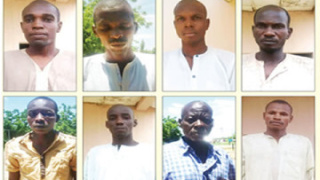 Jailed militant Islamists have taken up football as part of a government de-radicalisation scheme.
Jailed militant Islamists have taken up football as part of a government de-radicalisation scheme.It was not your average kick-around. The six-a-side game was inside the high walls of a Nigerian prison and the players wearing the smart green and yellow strips are all accused of being members of militant group Boko Haram.
The early-morning training session is part of a de-radicalisation programme. The jihadist group bans all sport so it is a sign of progress that these men in their 20s and 30s are playing at all.
“These are people who have a wild concept about life, who look at killing as a very easy something, so we have to work on them to change that ideology [and] for them to have respect for human life,” says Emmanuel Osagie, a member of the de-radicalisation team.
“Initially the participation was not encouraging but when they saw their colleagues coming back excited and feeling fulfilled from the sport it brought the others out,” he says.
‘Loving religion’
The man trying to teach some teamwork skills is in no doubt that this is helping change their outlook.
“Before, they didn’t tolerate others. There is supposed to be a spirit of sportsmanship and it is this spirit that makes them normal and reduces their radical ideology,” said Abioye Adeshina, who is in charge of sports at the prison.
A loud evangelical church service was taking place right next to the pitch – a coincidence, I think, rather than a conscious effort to instil religious tolerance in the 45 inmates who are referred to as “De-radicalisation Interest Clients”.
“When I came here, I wouldn’t take orders from the prison staff. I was always arguing with them. I didn’t consider them to be human beings,” says a stocky man in his mid-30s shortly after pulling off a few saves as the yellow team’s goalkeeper.
The man, who cannot be named for security reasons, said he was arrested at a checkpoint four years ago after banks and police stations were attacked in the northern Bauchi state. He denies any involvement in that violence but admits to being a Boko Haram member.
“I love my religion and when [former Boko Haram leader] Mohammed Yusuf came preaching to us, I started following him to the villages and towns where he was preaching,” he said.
Still awaiting trial, he said he was never armed and does not support the violent nature of the group.
The prisoner, who is from Borno, said he had long wanted to fight a holy war and had even once joined al-Qaeda with the intention of fighting in Afghanistan.
Despite his long-held views, he said the de-radicalisation programme in the prison has changed his outlook.
“When the imams came, I thought they were hypocrites and I would abuse them. But despite my aggression they persevered and when I realised they were giving me respect, I stared listening to them.
“As I talked with the imams, they convinced me that all that I had been doing was a mistake.
“I shed tears when I realised I had ruined my life. All my younger brothers are married with children but I’m not married and I have no child. So now I’m looking at how to start my life afresh.”
On the other side of the prison, past the open-air barbers, are the newly built classrooms where teachers and psychologists are helping the prisoners learn new skills, including jewellery-making and basic electronics.
A group counselling session is also underway, focusing on the dangers of drug abuse.
This treatment is certainly in stark contrast to the way human rights groups say Boko Haram suspects have been treated in the past.
Amnesty International said that 7,000 young men and boys have died in military detention since 2011.
The de-radicalisation programme is part of this “soft approach” to fighting terrorism. Those interacting with the inmates get vital clues which shed light on why extremism has found fertile ground in Nigeria

No comments:
Post a Comment